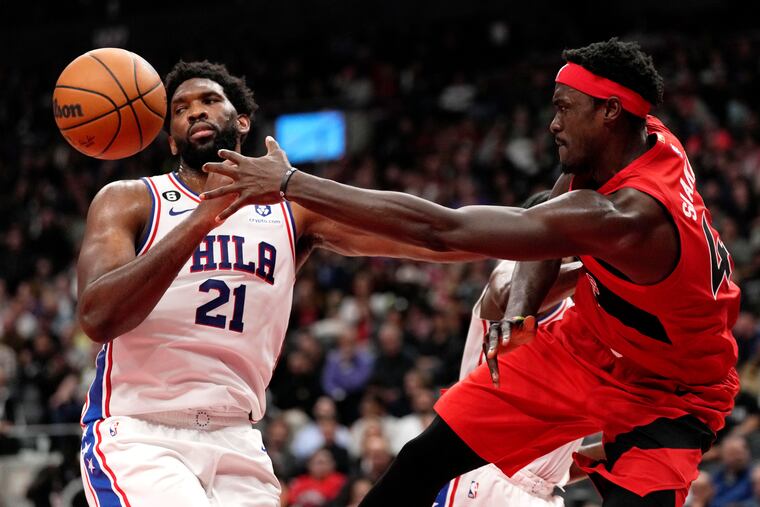‘If we made it, they can do it’: Cameroonians Joel Embiid, Pascal Siakam, Christian Koloko make history in Sixers-Raptors game
Wednesday's matchup marked the first time three Cameroonian players appeared in the same NBA game, a sign of Embiid and Siakam’s impact as the league continues initiatives to grow the game in Africa.

TORONTO — Christian Koloko used to stay awake during the overnight hours in his home country of Cameroon, devouring televised NBA games being played half a world away.
Sometimes, he would sneak in 30 minutes of sleep before school. Other times, he’d forgo any snoozing out of fear he would not wake up in time, instead heading straight to class with bleary eyes “just for the love of the game.”
Those late-night broadcasts are how a young Koloko was first exposed to players like Joel Embiid and Pascal Siakam, who also hail from the same country. Now a Toronto Raptors rookie center, Koloko joined those two players to create a historic Wednesday night. The Raptors’ 119-109 victory over the 76ers at Scotiabank Arena marked the first time three Cameroonian players shared the floor in the same NBA game, a sign of Embiid’s and Siakam’s impact as the league continues initiatives to grow the game in Africa.
» READ MORE: Overreaction or appropriate panic? Assessing story lines from the Sixers’ disappointing start
“That’s what I’m here for. That’s what we’re here for,” Embiid said late Wednesday. “… Especially coming from over there, where you don’t have a lot of opportunities, I want someone to look at me — I want someone to look at us — and believe that if we made it, they can also do it.
“It’s not going to be easy. You’ve got to be extremely lucky. But it is possible.”
Wednesday’s matchup was the kind that makes Troy Justice, the NBA’s vice president and head of international basketball development, “a little teary-eyed.” Embiid scored an efficient 31 points on 12-of-17 shooting and pulled down five rebounds. Siakam scored 19 of his 20 points in the first half to help the Raptors build a 17-point cushion, and added 13 assists. Koloko finished with four points and four rebounds off the bench.
All three players were on the floor at the same time when Koloko checked in about midway through the first quarter. That stretch included a “Welcome to the NBA” moment from Koloko’s countryman when Embiid flew past him for an authoritative, one-handed dunk. On the Raptors’ ensuing possession, Siakam buried a three-pointer.
Embiid, Siakam, and Koloko are all alumni of the Basketball Without Borders Africa camp, which pairs teenage international players with NBA coaches and players. As participants, Justice described all three players as raw in terms of basketball skills, but high-energy and hardworking. Embiid was a coach when Koloko was a camper in 2017, making it natural for them to say hello in the arena hallway while crossing paths between the Sixers’ and Raptors’ shootarounds Wednesday morning.
“We just want to find promising young talent that needs our support and give them all we can and to see them put on a journey to success,” Justice told The Inquirer by phone Wednesday afternoon. “We don’t try to predict in our camps. All we try to do is pour into them.”
After partaking in Basketball Without Borders, Embiid, Siakam, and Koloko played college basketball at Kansas, New Mexico State, and Arizona, respectively, before becoming first-round NBA draft picks. Embiid has morphed into the MVP runner-up in back-to-back seasons and was the league’s leading scorer in 2021-22, while Siakam became an All-Star in the 2019-20 season. Koloko is in his rookie season after blossoming into the Pac-12 Defensive Player of the Year and the conference’s Most Improved Player as a junior.
“I’m so happy to play against the big fella,” Embiid said of Koloko. “He’s going to be good. I like him a lot.”
These are not the first influential NBA players with African roots. Hakeem Olajuwon (Nigeria) and Dikembe Mutombo (Congo) are Hall of Famers. Luc Mbah a Moute, the NBA’s first Cameroonian player whom Embiid calls his basketball inspiration, participated in the first BWB Africa camp in 2003.
Now, though, Justice sees African players emulating Embiid’s versatility.
“He challenges the next generation of young players, no matter what your size is, to become very skilled,” Justice said. “The narrative on players from Africa is no longer athleticism or raw potential. Players coming out of our NBA Academy in Africa, our Basketball Without Borders program in Africa ... they’re skilled with high IQ.”
Siakam said Wednesday that he would still like to see improvements in basketball awareness and infrastructure (such as courts) in his home country. Now that life is more normal following two years of COVID-19 restrictions for international travel, Embiid’s goal is to return to Basketball Without Borders every year “to teach them the right way and try to just mentor.”
On his next trip, Embiid might meet 16-year-old Ulrich Kamka-Chomche, a Cameroonian coming up as part of the NBA Africa Academy, a training center in Senegal for the continent’s top prospects. The first time Justice met Kamka-Chomche, he was wearing a Siakam jersey.
“If that doesn’t tell you what these guys do for the next generation …” Justice said.
» READ MORE: 1-4 Sixers are again uninspiring in 119-109 loss to Raptors
That’s why it would not be a surprise if Kamka-Chomche, like a young Koloko, stayed up late to tune into Wednesday’s Raptors-Sixers game.
“It feels like something you can touch and something you can feel, because we’re doing it,” Siakam said. “I hope a little kid, 10 years from now, says, ‘Oh, man, I watched that game and I [saw] three people from Cameroon and I felt like, man, I can do that, too.’”